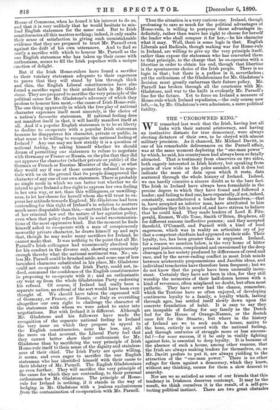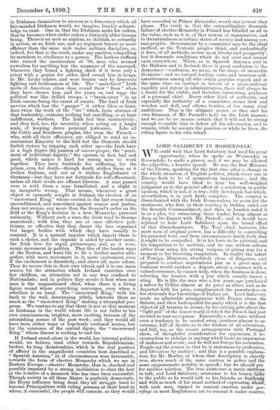111E " UNCROWNED KING " E remarked last week that
the Irish, having lost all links with their natural aristocracy, and having an instinctive distaste for true democracy, were always electing dictators of their own, to be obeyed with almost military precision. As it chanced, Mr. Michael Davitt, in one of his remarkable deliverances on the Parnell affair, was at the same moment deploring the " one-man power " by which, he said, his countrymen had always been so fatally attracted. That is testimony from observers on two sides, both eagerly interested in Irish history, but speaking from points of view wide as the poles asunder, and it does but indicate the mass of data upon which it rests, data scattered through the whole history of Ireland. Indeed, we can hardly conceive a sincere doubt as to the bare fact. The Irish in Ireland have always been formidable in the precise degree to which they have found and followed a leader; and failing to find one, have repeatedly, if not, indeed, constantly, manufactured a leader for themselves,—that is, have accepted an inferior man, have attributed to him the qualities they felt in need of, and have striven to believe that he could lead. They made leaders of Lord E. Fitz- gerald, Emmet, Wolfe Tone, Smith O'Brien, Stephens, all for different reasons ineffective persons; and they accepted Sarsfield, O'Connell, and Parnell with a kind of loud eagerness, which was in reality an articulate cry of joy that a competent chieftain had appeared on their side. Their loyalty, too, has been greater than is supposed. Ireland, for a reason we mention below, is the very home of bitter personal jealousies, complicated and envenomed by the deep cleavages in her society produced by differences of creed and race, and by the never-ending conflict in most Irish minds between aristocratic prepossessions and Jacobin ideas, and individual treacheries have therefore been frequent ; but we do not know that the people have been unusually incon- stant. Certainly they have not been in idea, for they still worship the memories of their half-dozen heroes with a kind of reverence, often misplaced no doubt, but often most pathetic. They have never had the chance, remember, which the Teutons have so often enjoyed, of developing continuous loyalty to a family, a loyalty which, lasting through ages, has settled itself slowly down upon the concrete foundation of habit. It is easy to say they are incapable of feeling for any family as the Dutch feel for the House of Orange-Nassau, or the Scotch once felt for the Stuarts; but where in the history of Ireland are we to seek such a house, native to the bone, entirely in accord with the national feeling, and through centuries of struggle more or less success- ful ?—for some success, if it be only in visibly fighting against fate, is essential to deep loyalty. It is because of the absence of such a house, among other reasons, that the Irish are always making leaders for themselves, or, as Mr. Davitt prefers to put it, are always yielding to the attraction of the " one-man power." There is no other refuge for them against a democracy, which they know, without any thinking, means for them a slow descent to anarchy. Nor are we so satisfied as some of our friends that this tendency in Irishmen deserves contempt. It may be the result, we think ourselves it is the result, of a self-pro- tecting political instinct. There are two great obstacles in Irishmen themselves to success as a democracy which all fair-minded Irishmen would, we imagine, frankly acknow- ledge to exist. One is, that the Irishman seeks for orders, that he becomes when under orders a distinctly abler human being. There is no mob so aimless, so childish, so cowardly in action, as an Irish one, and no regiment braver or more efficient than the same mob under military discipline, or, indeed, for,that is the truth, under any emotion compelling its members to obedience to a person. The lawless ruffians who ruined the insurrection of '98, men who seemed powerless for anything but the massacre of the unarmed, whenever they found a fighting chief, if it were only a priest with a genius for order, died round him in heaps, as Mr. Lecky relates, and were beaten only by desperate fighting and recklessness of life. The " anarchical" Irish mobs of American cities close round their " Boss " when they have chosen him, and for years on end wage the political war like drilled troops, a " break-away " in an Irish caucus being the rarest of events. The knot of Irish navvies which has the " ganger " it either likes or fears, does twice the work of the " lot" which, from absence of that leadership, contains nothing but unwilling, or at least indifferent, workers. The Irish feel this instinctively ; and they feel, too, the necessity, when acting on a larger scale, of keeping down personal jealousies. Like all the Celtic and Southern peoples, like even the French— who, with all their efficiency, are obliged to send an in- convenient Emperor to the field lest the Generals should forfeit victory by tripping each other up—the Irish have in a high degree the passion of amour-propre, the " senti- ment of individual dignity," the egoism, in fact, bad and good, which makes it hard for strong men to work together. They have fortitude for suffering, for the prison, even for death—though death strikes them as it strikes Italians, and not as it strikes Englishmen or Germans—but they have not fortitude for self-effacement, unless all their rivals are effaced likewise. A man passed over is with them a man humiliated, and a slight is an inexpiable wrong. That means, whenever a great object is earnestly sought in Ireland, the election of an " uncrowned King," whose control in the last resort being unconditioned, and sometimes against reason and justice, does not arouse, any more than the General's order on the field or the King's decision in a true Monarchy, personal animosity. Without such a man, the Irish tend to become anarchical ; with him, they are at once effective poli- ticians, so effective that they daunt the less organised but larger bodies with which they have usually to contend. It is a natural impulse which impels them to such a choice, and the impulse is aided by another cause, the Irish love for rapid, picturesque, and, as it were, scenic movement in politics. They tire of the leaden ways of the Teuton, and want life to be a livelier matter alto- gether, with more movement in it, more excitement, even if the excitement is disorderly, and above all, more colour. They do secure this in their own island, and it is one main reason for the attraction which Ireland exercises over her children, an attraction not in any way confined to Nationalists ; and in politics they secure it best when one man is the unquestioned chief, when there is a living figure round whom everything converges, even when a rebellion is on hand. The " uncrowned King," with his back to the wall, denouncing rebels, interests them as much as the " uncrowned King" making a triumphal pro- gress. We venture to say that there is not at this moment an Irishman in the world whose life is not fuller to his own consciousness, brighter, more exciting, because of the astonishing scenes of the past week ; and they would all have been either tame or hopelessly confused scenes, but for the existence of the central figure, the " uncrowned King " whose throne is rocking to and fro.
If Ireland stood alone in the world, her internal politics would, we believe, tend either towards Republicanism, broken by long dictatorships, which is the real position of affairs in the magnificent countries best described as " Spanish America," or, if circumstances were favourable, towards the form of elective Monarchy which we see in Eastern Europe,—elective Monarchy, that is, checked and possibly impaired by .a strong inclination to elect the heir or the relative of a monarch who has once been successful. Though society in all these States is perfectly democratic, the Boyar influence being dead, they all struggle hard to become Principalities with ruling persons at their head to whom, if successful, the people will concede, as they would have conceded to Prince Alexander, nearly any powers they please. The truth is, that the extraordinilary dramatic failure of elective Monarchy in Poland has blinded us all to the value, such as it is, of that system of organisation, and to its naturalness in certain states of society and among cer- tain peoples. Government by a committee may be the ideal method, as the Teutonic peoples think, and undoubtedly it does, of all methods, secure most liberty and prosperity ; but it demands conditions which do not exist and cannot exist everywhere. When, as in Spanish America and in the Balkans and in Ireland, there is great confusion in the democracy—confusion, we mean, in the shape of incurable divisions—and no natural leading caste, and immense self- assertiveness among all who obtain popular regard, and at the same time an instinct in favour of a quasi-military• rapidity and rigour in administration, there will always be a desire for the visible, and therefore interesting, guidance of a personal chief. Every other kind of authority, and especially the authority of a committee, seems slow and wooden and dull, and allows, besides, of too many rival ambitions. That is the ultimate secret, or that and his own firmness, of Mr. Parnell's hold on the Irish masses ; and we are by no means certain that it will not be strong enough to enable him to defeat all his adversaries, and to remain, while he accepts the position or while he lives, the ruling figure in his own island.























































 Previous page
Previous page